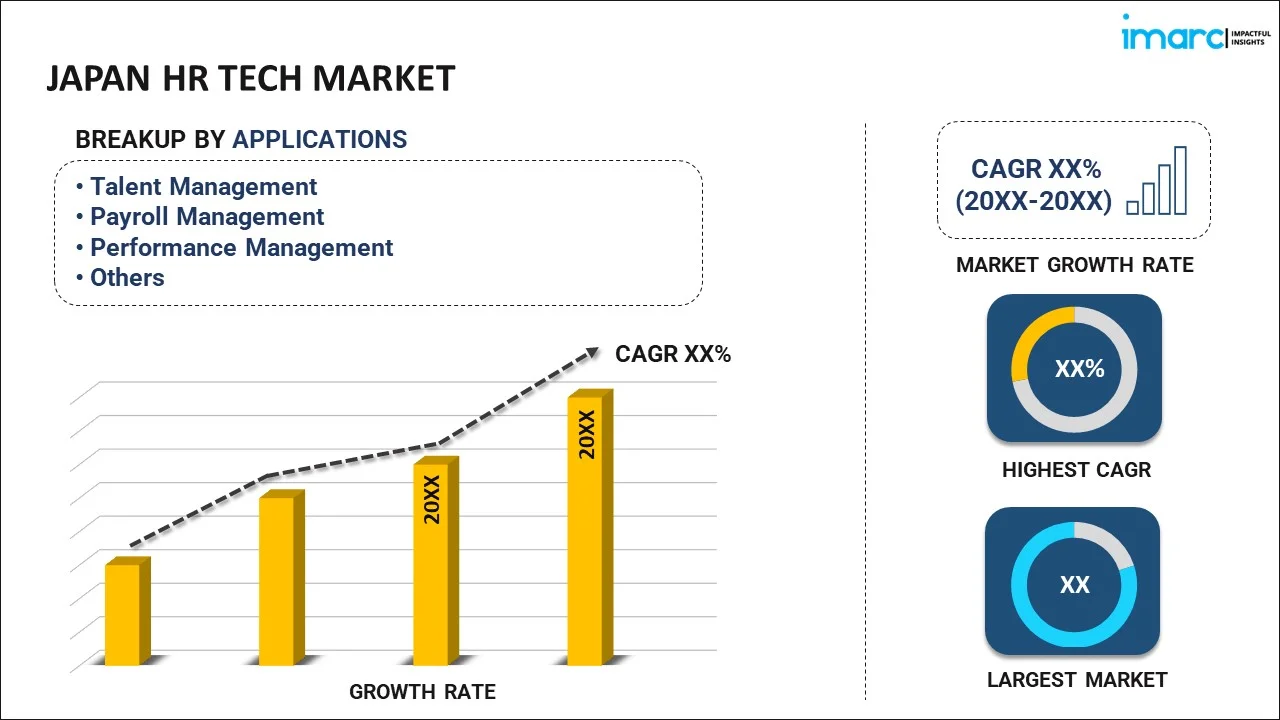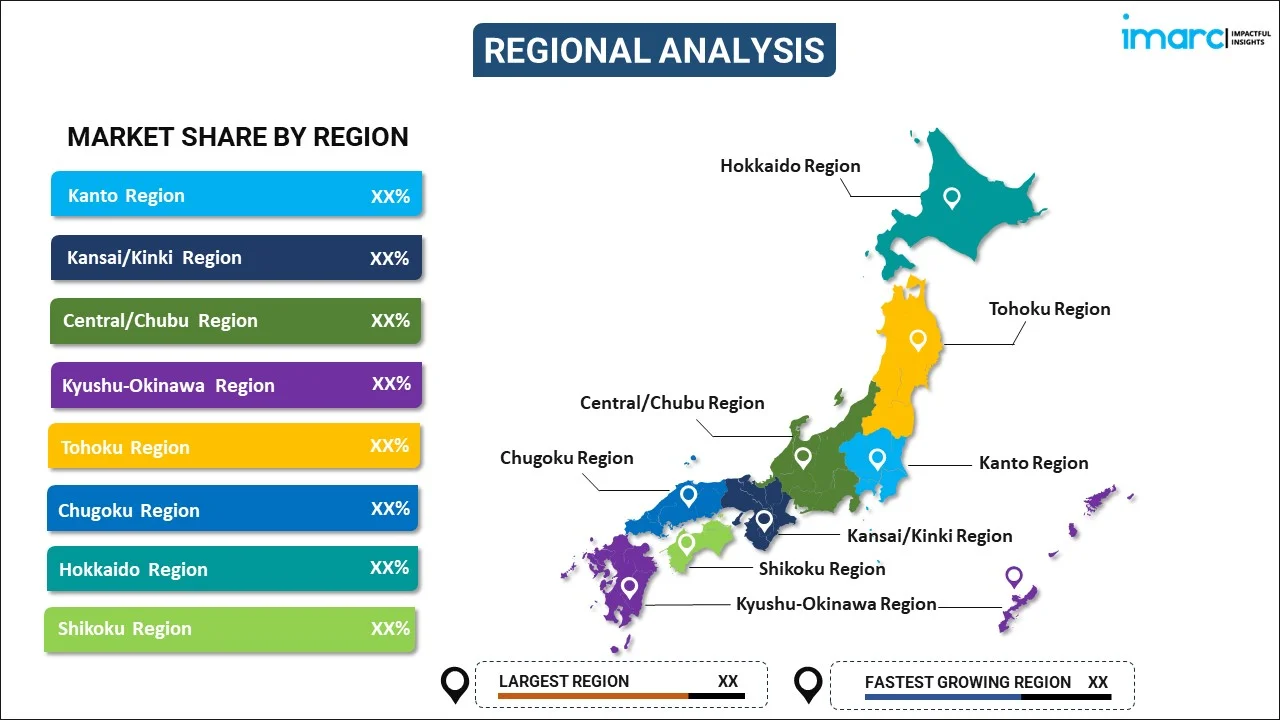
Japan HR Tech Market Report by Application (Talent Management, Payroll Management, Performance Management, Workforce Management, Recruitment, and Others), Type (Inhouse, Outsourced), End Use Industry (TTH (Travel, Transportation, Hospitality), Public Sector, Health Care, Information Technology, BFSI (Banking, Financial services, and Insurance), and Others), Company Size (Less Than 1k Employees, 1k -5k Employees, Greater Than 5k Employees), and Region 2025-2033
Market Overview:
The Japan HR tech market size reached USD 2.0 Billion in 2024. Looking forward, IMARC Group expects the market to reach USD 3.9 Billion by 2033, exhibiting a growth rate (CAGR) of 6.94% during 2025-2033. A shrinking workforce across the country, rising focus on employee experience, stringent regulatory compliance requirements, and ongoing technological advancements in artificial intelligence (AI) and machine learning (ML) represent some of the key factors driving the market.
|
Report Attribute
|
Key Statistics
|
|---|---|
|
Base Year
|
2024
|
|
Forecast Years
|
2025-2033
|
|
Historical Years
|
2019-2024
|
| Market Size in 2024 | USD 2.0 Billion |
| Market Forecast in 2033 | USD 3.9 Billion |
| Market Growth Rate 2025-2033 | 6.94% |
HR Tech, short for Human Resources Technology, refers to the software and hardware used by organizations to manage and enhance their HR processes. The primary focus of HR Tech is to streamline traditional HR functions like payroll, recruitment, employee records management, and performance evaluation. At present, HR Tech is embracing automation, using tools like Artificial Intelligence (AI) and Machine Learning (ML) to transform the way HR departments operate. These technologies are enabling more efficient data processing, providing insights into employee engagement and productivity, and improving the recruitment process through advanced candidate screening and predictive analytics. Besides this, HR Tech significantly contributes to enhancing the employee experience. Modern HR platforms are incorporating user-friendly interfaces and mobile accessibility, making it easier for employees to access HR services and information. HR Tech also plays a crucial role in promoting diversity and inclusion in the workplace. Tools are being developed to mitigate unconscious bias in hiring processes and to analyze workplace diversity metrics, supporting more equitable and inclusive organizational cultures. As organizations continue to navigate a dynamic business environment, HR Tech is providing critical support in managing workforce challenges, adapting to new working models such as remote work, and maintaining compliance with evolving labor laws and regulations. As a result, HR Tech is rapidly gaining traction as a vital component in the strategic planning and operational efficiency of modern businesses.
Japan HR Tech Market Trends:
The Japan HR tech market is currently experiencing significant growth, propelled by a combination of socio-economic factors, technological advancements, and changing workforce dynamics. A shrinking workforce across the country and the need for improved productivity and efficiency in HR processes represent the primary factors driving the market growth. Moreover, Japan’s aging population and declining birthrate are leading to a workforce shortage. This demographic shift is accelerating the adoption of HR Tech solutions to manage talent more effectively, particularly in sourcing and retaining employees. Companies are increasingly leveraging HR Tech to streamline their recruitment processes, targeting a broader talent pool, including underrepresented groups like women and older workers. Additionally, technological advancements, particularly in artificial intelligence (AI) and machine learning (ML), represent another major growth-inducing factor. These technologies are being integrated into HR systems to automate routine tasks, analyze employee data for insights into engagement and productivity, and enhance decision-making processes. AI-powered tools are aiding in talent acquisition, performance management, and employee training, making these processes more efficient and data-driven, further catalyzing market growth. Moreover, the changing nature of work, spurred by the coronavirus (COVID-19) pandemic, has impelled the HR Tech market in Japan. Along with this, the rise of remote work and the escalating need for flexible work arrangements have necessitated the adoption of digital tools for virtual collaboration, employee engagement, and performance tracking. HR Tech solutions are facilitating these new work models by providing platforms for remote employee management and communication, thus stimulating market growth. Furthermore, Japanese companies are focusing on enhancing employee experience and engagement, recognizing the impact on productivity and retention. HR Tech is enabling personalized employee experiences through tailored training programs, wellness initiatives, and feedback mechanisms. In line with this, the heightened need for compliance with labor laws and the increasing emphasis on diversity and inclusion in the workplace are facilitating the development of tools to ensure regulatory compliance and support more inclusive hiring practices, thereby fueling market growth.
Japan HR Tech Market Segmentation:
IMARC Group provides an analysis of the key trends in each segment of the market, along with forecasts at the country level for 2025-2033. Our report has categorized the market based on application, type, end use industry, and company size.
Application Insights:

- Talent Management
- Payroll Management
- Performance Management
- Workforce Management
- Recruitment
- Others
The report has provided a detailed breakup and analysis of the market based on the application. This includes talent management, payroll management, performance management, workforce management, recruitment, and others.
Type Insights:
- Inhouse
- Outsourced
A detailed breakup and analysis of the market based on the type have also been provided in the report. This includes inhouse and outsourced.
End Use Industry Insights:
- TTH (Travel, Transportation, Hospitality)
- Public Sector
- Health Care
- Information Technology
- BFSI (Banking, Financial services, and Insurance)
- Others
The report has provided a detailed breakup and analysis of the market based on the end use industry. This includes TTH (travel, transportation, hospitality), public sector, health care, information technology, BFSI (banking, financial services, and insurance), and others.
Company Size Insights:
- Less Than 1k Employees
- 1k -5k Employees
- Greater Than 5k Employees
A detailed breakup and analysis of the market based on the company size have also been provided in the report. This includes less than 1k employees, 1k -5k employees, and greater than 5k employees.
Regional Insights:

- Kanto Region
- Kansai/Kinki Region
- Central/ Chubu Region
- Kyushu-Okinawa Region
- Tohoku Region
- Chugoku Region
- Hokkaido Region
- Shikoku Region
The report has also provided a comprehensive analysis of all the major regional markets, which include Kanto Region, Kansai/Kinki Region, Central/ Chubu Region, Kyushu-Okinawa Region, Tohoku Region, Chugoku Region, Hokkaido Region, and Shikoku Region.
Competitive Landscape:
The market research report has also provided a comprehensive analysis of the competitive landscape. Competitive analysis such as market structure, key player positioning, top winning strategies, competitive dashboard, and company evaluation quadrant has been covered in the report. Also, detailed profiles of all major companies have been provided.
Japan HR Tech Market Report Coverage:
| Report Features | Details |
|---|---|
| Base Year of the Analysis | 2024 |
| Historical Period | 2019-2024 |
| Forecast Period | 2025-2033 |
| Units | Billion USD |
| Scope of the Report | Exploration of Historical and Forecast Trends, Industry Catalysts and Challenges, Segment-Wise Historical and Predictive Market Assessment:
|
| Applications Covered | Talent Management, Payroll Management, Performance Management, Workforce Management, Recruitment, Others |
| Types Covered | Inhouse, Outsourced |
| End Use Industries Covered | TTH (Travel, Transportation, Hospitality), Public Sector, Health Care, Information Technology, BFSI (Banking, Financial services, and Insurance), Others |
| Company Sizes Covered | Less Than 1k Employees, 1k -5k Employees, Greater Than 5k Employees |
| Regions Covered | Kanto Region, Kansai/Kinki Region, Central/ Chubu Region, Kyushu-Okinawa Region, Tohoku Region, Chugoku Region, Hokkaido Region, Shikoku Region |
| Customization Scope | 10% Free Customization |
| Post-Sale Analyst Support | 10-12 Weeks |
| Delivery Format | PDF and Excel through Email (We can also provide the editable version of the report in PPT/Word format on special request) |
Key Questions Answered in This Report:
- How has the Japan HR tech market performed so far and how will it perform in the coming years?
- What has been the impact of COVID-19 on the Japan HR tech market?
- What is the breakup of the Japan HR tech market on the basis of application?
- What is the breakup of the Japan HR tech market on the basis of type?
- What is the breakup of the Japan HR tech market on the basis of end use industry?
- What is the breakup of the Japan HR tech market on the basis of company size?
- What are the various stages in the value chain of the Japan HR tech market?
- What are the key driving factors and challenges in the Japan HR tech?
- What is the structure of the Japan HR tech market and who are the key players?
- What is the degree of competition in the Japan HR tech market?
Key Benefits for Stakeholders:
- IMARC’s industry report offers a comprehensive quantitative analysis of various market segments, historical and current market trends, market forecasts, and dynamics of the Japan HR tech market from 2019-2033.
- The research report provides the latest information on the market drivers, challenges, and opportunities in the Japan HR tech market.
- Porter's five forces analysis assist stakeholders in assessing the impact of new entrants, competitive rivalry, supplier power, buyer power, and the threat of substitution. It helps stakeholders to analyze the level of competition within the Japan HR tech industry and its attractiveness.
- A competitive landscape allows stakeholders to understand their competitive environment and provides an insight into the current positions of key players in the market.
Need more help?
- Speak to our experienced analysts for insights on the current market scenarios.
- Include additional segments and countries to customize the report as per your requirement.
- Gain an unparalleled competitive advantage in your domain by understanding how to utilize the report and positively impacting your operations and revenue.
- For further assistance, please connect with our analysts.
 Request Customization
Request Customization
 Speak to an Analyst
Speak to an Analyst
 Request Brochure
Request Brochure
 Inquire Before Buying
Inquire Before Buying




.webp)




.webp)












